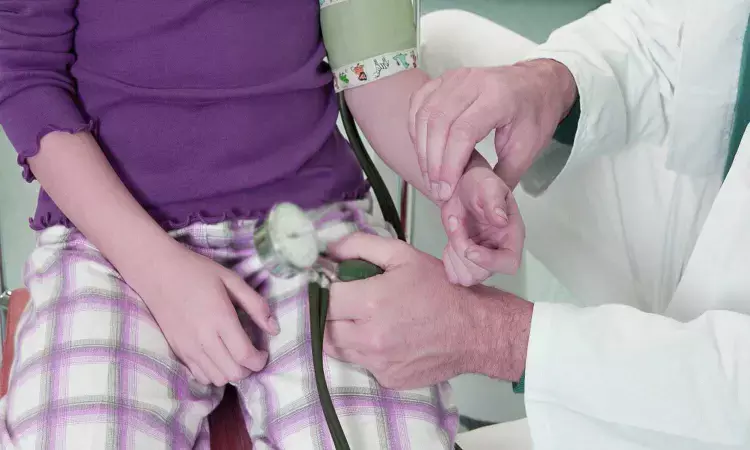- Home
- Medical news & Guidelines
- Anesthesiology
- Cardiology and CTVS
- Critical Care
- Dentistry
- Dermatology
- Diabetes and Endocrinology
- ENT
- Gastroenterology
- Medicine
- Nephrology
- Neurology
- Obstretics-Gynaecology
- Oncology
- Ophthalmology
- Orthopaedics
- Pediatrics-Neonatology
- Psychiatry
- Pulmonology
- Radiology
- Surgery
- Urology
- Laboratory Medicine
- Diet
- Nursing
- Paramedical
- Physiotherapy
- Health news
- Fact Check
- Bone Health Fact Check
- Brain Health Fact Check
- Cancer Related Fact Check
- Child Care Fact Check
- Dental and oral health fact check
- Diabetes and metabolic health fact check
- Diet and Nutrition Fact Check
- Eye and ENT Care Fact Check
- Fitness fact check
- Gut health fact check
- Heart health fact check
- Kidney health fact check
- Medical education fact check
- Men's health fact check
- Respiratory fact check
- Skin and hair care fact check
- Vaccine and Immunization fact check
- Women's health fact check
- AYUSH
- State News
- Andaman and Nicobar Islands
- Andhra Pradesh
- Arunachal Pradesh
- Assam
- Bihar
- Chandigarh
- Chattisgarh
- Dadra and Nagar Haveli
- Daman and Diu
- Delhi
- Goa
- Gujarat
- Haryana
- Himachal Pradesh
- Jammu & Kashmir
- Jharkhand
- Karnataka
- Kerala
- Ladakh
- Lakshadweep
- Madhya Pradesh
- Maharashtra
- Manipur
- Meghalaya
- Mizoram
- Nagaland
- Odisha
- Puducherry
- Punjab
- Rajasthan
- Sikkim
- Tamil Nadu
- Telangana
- Tripura
- Uttar Pradesh
- Uttrakhand
- West Bengal
- Medical Education
- Industry
Kidney Injury Significantly Increases Hypertension Risk, Study Finds

Atal Bihari Vajpayee Medical College Set to Launch IPD Services
USA: Patients who experience renal trauma may face a significantly elevated risk of developing hypertension in the years following their injury, a new study published in the Urology journal has revealed. This research, led by Dr. Jane T. Kurtzman from the Division of Urology, Department of Surgery, University of Utah Hospital, brings important attention to the long-term cardiovascular risks associated with kidney injuries—an area that has remained underexplored until now. Kidney Injury Significantly Increases Hypertension Risk, Study Finds
The researchers conducted a comprehensive retrospective analysis using the Merative MarketScan insurance claims database, covering data from 2011 to 2017. Their objective was to evaluate whether individuals who sustained renal trauma were at higher risk of developing new-onset hypertension (HTN) compared to patients with other types of urologic injuries.
A total of 7,882 patients were included in the analysis. Among them, 4,703 had suffered renal trauma, while the control group included patients with isolated bladder or urethral injuries. To ensure the accuracy of the comparison, individuals were excluded if they had both renal and lower urinary tract injuries, were diagnosed with pre-existing hypertension, were younger than 18 years of age, or lacked at least one year of pre-injury insurance enrollment.
The findings of the study were both significant and concerning:
- 35% of patients with renal trauma developed new-onset hypertension, compared to 21% in the control group—a statistically significant difference.
- After adjusting for confounding factors, patients with renal trauma were found to be nearly 80% more likely to develop hypertension than those in the control group (Hazard Ratio [HR] 1.8).
- Among various treatment approaches, patients who underwent angioembolization had the highest risk of developing hypertension (HR 3.4), followed by those who had a nephrectomy (HR 2.4), indicating that more invasive procedures may carry greater long-term cardiovascular consequences.
- Additional risk factors included older age, female sex, prolonged hospital stays, and comorbidities such as diabetes, obesity, hyperlipidemia, and alcohol use.
- Notably, even those who were managed conservatively for renal trauma—without surgical intervention—still demonstrated a significant risk of developing hypertension over time.
According to the researchers, the investigation is the largest and first longitudinal cohort study to explore the association between renal trauma and subsequent hypertension. They advocate for long-term follow-up in patients who have sustained renal trauma, regardless of how the injury was managed.
“The study highlights the importance of proactive follow-up in patients with renal trauma, not only to manage the immediate injury but also to mitigate the long-term risk of cardiovascular disease through early detection and management of hypertension,” the researchers concluded.
Reference:
Kurtzman, J. T., Swallow, M., Horns, J. J., Woodle, T., McCormick, B., & Myers, J. (2025). Risk of Hypertension after Renal Trauma: An Analysis of a Large Insurance Claims Database. Urology. https://doi.org/10.1016/j.urology.2025.07.045
Dr Kamal Kant Kohli-MBBS, DTCD- a chest specialist with more than 30 years of practice and a flair for writing clinical articles, Dr Kamal Kant Kohli joined Medical Dialogues as a Chief Editor of Medical News. Besides writing articles, as an editor, he proofreads and verifies all the medical content published on Medical Dialogues including those coming from journals, studies,medical conferences,guidelines etc. Email: drkohli@medicaldialogues.in. Contact no. 011-43720751


